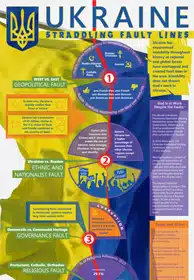Ukraine: Straddling Fault Lines


Download as PDF Download as Image
<p><img src="https://s3-us-west-2.amazonaws.com/missio-graphics/Volume+3/missiographic_UkraineFaultLines.jpg" alt="" width="800" /></p>
<p><a href="https://missionexus.org/ukraine-straddling-fault-lines/"><strong>Ukraine: Straddling Fault Lines</strong></a><br />Living on a fault line is full of unknowns. Whether the unknowns are environmental, social, religious or economic, they are unsettling. But even though Ukraine has faced so many unknowns throughout its history, the Church is a powerful witness within Ukraine and beyond its borders. Explore the reality in Ukraine and the opportunities facing the Church as they straddle the fault lines.</p>Personal Reflection
What fault lines are you straddling in your personal or professional life? Maybe there are broken relationships within your family. Your company might be going through a merger or acquisition. Maybe you’ve been through a hurricane, flood or fire that has caused your life to be turned upside down. Whatever the fault lines you are facing, they will allow you to feel empathy for the people of Ukraine. Imagine what they are facing as maps are being redrawn and the war is changing families forever. Then be encouraged by the faithfulness of Ukrainian Christians throughout this upheaval. Pray for their impact to grow even in these uncertain times and then ask God to help you represent Him well as you straddle your fault lines.
Engaging the Church
When you speak to a small group, Sunday School class or congregation, it is hard to talk about situations that are full of unknowns. The crisis in Ukraine is a prime example. How do you talk about a situation that seems to be constantly changing? One day the ground seems to have settled and the next day another tragedy is being reported on the news. But in the midst of the unknowns, the people need Jesus and the Ukrainian Church is front-and-center. Are you pushing through the unknowns to pray for the Church in Ukraine? How are you helping those in your congregation to understand the long-standing fault lines in this part of the world? As you present these challenges to those in your church, how will you encourage them to respond? This Missiographic provides some simple ways to pray, but consider what you could do to provide encouragement to the Church and witness to the people of Ukraine. One simple way is providing supplies and funding for the refugees of the crisis. Do some research and identify ministries who are providing this type of relief.
Organizational Application
How is your organization serving Ukraine? In uncertain times it is easy to pull out and focus resources somewhere else. If you do stay engaged it is easy to focus on the urgent needs of relief rather than the long-term goals of seeing the Church grow. If you interviewed some of those in the Ukrainian Church who know of your ministry, what would they say? Would they see you as a lifeline and support during the recent tremors or would they see your ministry as having little impact on them or their community? With such a strong Church that is used to living on the fault lines, ask God how you can support these believers and what you can learn from them
Good information is key for any individual or ministry. For more insights look at missiographics.com.
| Sources: | |
| 1 | BBC, Ukraine in Maps, 11/4/2014 http://www.bbc.com/news/world-europe-27308526 |
| 2 | Transparency International http://ti-ukraine.org/en/news/oficial/5053.html |
| 3 | East West Church & Ministry Report, Summer 2014 http://www.eastwestreport.org/pdfs/ew22-3.pdf |
| 4 | East West Church & Ministry Report, Summer 2014 http://www.eastwestreport.org/pdfs/ew22-3.pdf |
UKRAINE – Straddling the Fault Lines
*GMI is using the population number of 46 million for Ukraine which includes the Crimea region. This decision is important because all other numbers throughout the infographic related to religious statistics include Crimea. This is not a political statement about the current dispute between Ukraine and Russia.
Supplementary notes by Dr. Mark Elliott, Editor, East-West Church and Ministry Report
FOUR FAULT LINES
1. Geopolitical fault – East vs. West
At least since the seventeenth century, Russia has vacillated in its love-hate relationships with the West. For example, there have been seasons of intense emulation—and loathing—of all things French, and of all things German. More recently, Russia succumbed to overwrought adulation of all things American in the early 1990s and then to equally overwrought hostility towards all things American today.
The same is true of Ukraine, the difference being that Russia has chosen its foreign loves and hates, whereas outside forces have largely dictated to Ukraine its vacillating western and eastern orientations. For centuries it has struggled in succession to fend off domination by Muslim Ottoman Turks, Catholic Poles, Russian Orthodox, then Russian Communists.
2. Ethnic and nationalist fault – Russian vs. Ukrainian
Putin’s military moves in Crimea and eastern Ukraine, by severing Kyiv’s hold on its most strongly ethnic Russian regions, are having the effect of making the remainder of the country much more thoroughly Ukrainian in language and nationality. The unintended consequence for Putin is the creation of a Ukraine much more solidly pro-Western in its orientation.
3. Communist heritage vs. new democratic governance
Ukraine presently is attempting to overcome its legacy of twentieth-century Russian Communist domination. Romanian Danut Manastireanu has written an entire book on the difficulties involved in citizens of post-Soviet states overcoming the constraints of conformist and collectivist mentalities and entrenched corruption. (After Liberation, Then What?, World Vision, 2012). Transparency International judges Ukraine to be even more corrupt than Russia. To move in a Western, democratic direction, as most Ukrainians desire, will require serious, substantive government reform, which Maidan supporters will favor and which Ukraine’s wealthy oligarchs will oppose.
4. Historic Church faults and fragments – Orthodox, Catholic, Protestant
| Denomination (note three Orthodox churches and two Catholic churches) | % of religious adherents, 2010 |
| Orthodox (Moscow Patriarchate) |
34.3% |
| Protestants |
29.1% |
| Orthodox (Kyiv Patriarchate) |
12.5% |
| Catholic (Eastern-Rite) |
10.7% |
| Orthodox (Ukrainian Autocephalous) |
3.5% |
| Catholic (Roman) |
3.1% |
For further details and analysis, see the special theme edition on the current Ukrainian crisis: East-West Church and Ministry Report, Volume 22, No. 3 (Summer 2014), www.eastwestreport.org
Permissions
The representation of this data is copyrighted by GMI and the information within is used by permission. GMI grants users the right to reproduce this image digitally and in print for the purpose of educating and engaging audiences with the content. All use must retain the GMI branding and sponsorship bar located at the bottom of the infographic. Any use of this image in a paid product or service requires permission from GMI. If you are interested in licensing this image for use in your product or service, please email info@missiographics.com.




Responses